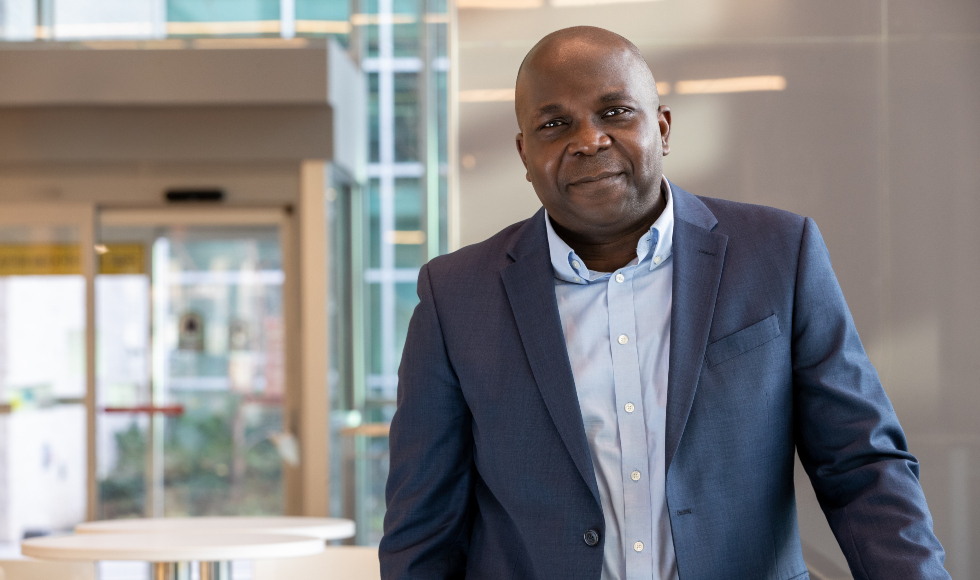No one left behind: Promoting and protecting global human rights

Photo by Georgia Kirkos
BY Ruth Adair
November 2, 2021
“Development is a human right. Everyone should have equal access to economic, social, cultural and political progress. But the right to development hasn’t really gained the kind of attention that it deserves, and we’re working to change that.”
Bonny Ibhawoh
Senator William McMaster Chair in Global Human Rights
Chair of the UN Expert Mechanism on the Right to Development
The issue | Inequality between nations is getting worse, not better
Bonny Ibhawoh is the person the United States Congress calls on for advice on how to confront America’s legacy of slavery and racial injustice.
The Senator William McMaster Chair in Global Human Rights is a UN appointed human rights expert. His work seeks to address systemic inequalities and human rights violations globally – issues that have been amplified by the COVID-19 global health crisis.
Even before the pandemic, the international community was struggling to achieve Sustainable Development Goal 10: Reducing inequality within and among countries.
“Now COVID-19 has exacerbated existing racial, social, political and economic inequalities, threatening human rights among the world’s most vulnerable people and communities,” says Ibhawoh.
As the Canadian government ramps up efforts to reduce discrimination and poverty here at home in support of SDG 10, Ibhawoh is working tirelessly to advance equality through his research and service in global human rights and peace/conflict studies.
The research | Global development, equality and human rights
In May 2020, the UN Human Rights Council named Ibhawoh Chair of the UN Expert Mechanism on the Right to Development.
During his three-year term, he’s responsible for monitoring and reporting on conditions related to the right to development, which is the right of individuals and countries to freely enjoy economic, social, cultural and political progress.
“My goal is to strengthen the right to development while empowering grassroots organizations to use it in their work,” explains Ibhowah, who is working in collaboration with four other experts on the panel.
This global commitment intersects with his research at McMaster’s Centre for Human Rights and Restorative Justice (CHRRJ), which also supports SDG 10, as well as SDG 16. He’s exploring how countries use restorative justice after human rights have been violated during major disruptions such as civil war and political upheaval. Specifically, Ibhawoh is studying truth and reconciliation commissions worldwide to determine which models work best and why.
Bonny Ibhawoh appointed a Fellow of the Royal Society of Canada
and
Global citizens’ assembly brings the voice of the people to COP26
The impact | Defining best practices for improving lives
“As COVID-19 worsens old inequalities and generates new ones, there’s an urgent need for evidence-based strategies to advance SDG 10,” says Ibhawoh.
That’s why he’s creating crucial insight for academics, policymakers and practitioners, and community organizations involved in this mission. An internship program at the CHRRJ also offers experiential learning to the next generation of human rights researchers.
Ibhawoh’s examination of truth commissions is building an extensive database and uncovering best practices to help create better outcomes for countries rebuilding after human rights abuses. Ibhawoh also hopes this knowledge can be used in the criminal justice and education systems, where leaders are increasingly opting for restorative justice approaches.
At the UN, he’s helping to bring renewed attention to the right to development during a pandemic which is eroding it. The panel will identify and share practical solutions for reinvigorating this right globally.
Lessons learned | Engage with the grassroots to have a direct impact
Ibhawoh says that human rights researchers must go the extra mile for their work to make a difference.
“It can be difficult and expensive but gathering information from people in the field rather than using indirect sources is essential,” he says. “Then, when the research is done, researchers should disseminate their findings back to those same individuals and groups.”
In a time when international travel is complicated, Ibhawoh recommends forging partnerships with trusted local stakeholders who can make these connections. By joining forces, researchers and grassroots organizations increase their capacity to achieve SDG 10 targets.
Bonny Ibhawoh’s work exemplifies McMaster’s commitment to advancing the United Nations’ Sustainable Development Goals (SDGs). Learn more about the best ways to align research with the UN’s SDGs.
This article, originally written in December 2020, was updated in November 2021.


